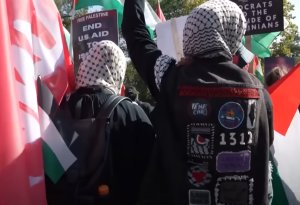Introduction
In the suburbs of Chicago lies a community known as Little Palestine, home to one of the largest concentrations of Palestinian Americans in the United States. This enclave, primarily located in Bridgeview, Illinois, has long been a hub for Palestinian culture, resilience, and resistance, particularly in the face of ongoing conflicts in the Middle East and growing discrimination in the United States. Recent events have only strengthened the community’s resolve, as they navigate the challenges posed by war, racism, and disenfranchisement.

Establishment and Growth of Little Palestine
Little Palestine in Chicago’s southwest suburbs began to take shape in the late 1980s and early 1990s. It grew as a significant diasporic center for Palestinians, many of whom were displaced during the wars in 1948 and 1967. The community has become deeply ingrained in the area, with many residents having direct ties to the ongoing conflict in Gaza and the broader Palestinian territories. The neighborhood is not only a residential area but also a cultural and economic hub for Palestinians and other Arabs in the region.
The Impact of Israel’s War on Gaza
The recent escalation of violence in Gaza, which has resulted in the deaths of over 40,200 Palestinians, including thousands of children, has had a profound impact on the residents of Little Palestine. Many community members have family and friends in Gaza, making the conflict a deeply personal issue. This connection to the conflict has spurred a range of responses within the community, from organizing donations to engaging in activism. Businesses in the area, such as Elbasha Sweets, have become focal points for these efforts, collecting donations to support those affected by the war in Gaza.
FBI Surveillance and Community Resilience
The Palestinian community in Bridgeview has a long history of facing state violence and surveillance, particularly from the FBI. In the late 1990s and following the events of 9/11, there was significant FBI scrutiny on community leaders and mosques in the area. This period of heightened surveillance left many families traumatized, fostering a sense of distrust towards the government. Despite these challenges, the community remained united and resilient, building a strong support network that continues to this day.
Rise in Hate Crimes and Islamophobia
Since the events of October 7, when violence in Gaza intensified, there has been a notable increase in hate crimes and Islamophobic attacks against Palestinian Americans and other Muslims in the United States. The rhetoric from the Biden administration, which has been criticized for its unwavering support of Israel, has further fueled anti-Arab and anti-Muslim sentiments. The community in Little Palestine has experienced this backlash firsthand, with incidents such as the brutal murder of a six-year-old boy by his landlord, who believed the child would grow up to be a terrorist. This act of violence, along with others, underscores the dangerous consequences of political rhetoric that dehumanizes and targets specific groups.
Support for Palestinian-Owned Businesses
In response to the hostile political climate, the community in Little Palestine has rallied around Palestinian-owned businesses as a form of resistance and solidarity. These businesses not only serve as economic lifelines but also as spaces for communal support. The recent opening of a Palestinian-owned coffee house in the area, which quickly became successful, exemplifies the importance of such enterprises. The owners, driven by the need to support their community in a time of crisis, see their business as a crucial part of the local support system. They believe that by sustaining Palestinian businesses, they are helping to build a self-reliant community that can withstand external pressures.
The Legacy of Activism and Community Organizing
Little Palestine’s legacy of activism is deeply rooted in the experiences of its residents. Many community members, such as the children of refugees from the 1948 and 1967 wars, have continued the tradition of activism and organizing. One notable figure in the community discussed the impact of his grandfather, who helped establish the first Arab American Community Center in the area. This legacy of activism has been passed down through generations, motivating current leaders to continue advocating for Palestinian rights and community empowerment.
Conclusion
As the residents of Little Palestine continue to navigate the challenges of war, racism, and disenfranchisement, their unity and resilience remain steadfast. The community’s strong presence in Chicago, despite decades of adversity, stands as a testament to their power and determination. By supporting each other through business, activism, and cultural preservation, the people of Little Palestine demonstrate the enduring strength of their community and their unwavering commitment to their cause.

